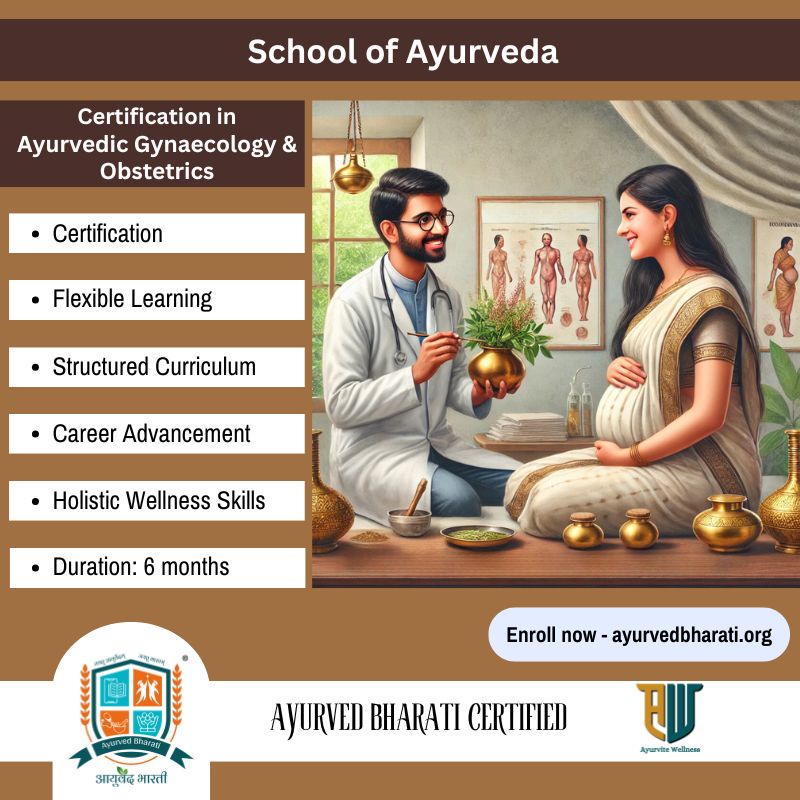Discover the ancient wisdom of Ayurveda as it applies to women’s health, from fertility to pregnancy and beyond, with our Certificate in Ayurvedic Gynaecology & Obstetrics. This course combines the time-tested principles of Ayurveda with modern understandings of women’s health, providing you with a holistic perspective on gynecology and obstetrics. Ideal for anyone interested in supporting women’s health naturally, this course is designed to deepen your knowledge and enhance your skills in Ayurvedic practices specific to women’s wellness.
Course Overview
- Course Duration: 6 months
- Eligibility: Open to anyone interested in Ayurvedic gynecology and obstetrics, with or without prior experience.
- Mode of Education: Online
- Certification: Receive a certificate of completion awarded by Ayurved Bharati, adding credibility to your professional profile.
- LMS and Digital Library Access: Gain access to a comprehensive Learning Management System (LMS) and digital library developed by the experts, filled with resources on Ayurvedic gynecology, obstetrics, and holistic women’s health.
Why Choose the Certificate in Ayurvedic Gynaecology & Obstetrics?
- Online flexible Learning: Enjoy the convenience and flexibility of online learning at your own time and place.
- Comprehensive Resource Access: Access the university’s LMS and digital library, providing you with a wealth of resources on Ayurvedic women’s health.
- Specialized Curriculum: The course covers all aspects of Ayurvedic gynecology and obstetrics, from menstrual health to postpartum care.
Course Highlights
1. Comprehensive Curriculum
- 06 Month Syllabus
- Paper 01 Communicative Skill
- Paper 02 Fundamentals of Ayurveda in Women’s Health
- Paper 03 Menstrual Health & Disorders
- Paper 04 Fertility and Conception (Garbha Dharana)
- Paper 05 Ayurvedic Obstetrics (Prasuti Tantra)
- Paper 06 Pregnancy Complications & Ayurvedic Management
- Paper 07 Labor and Delivery (Prasava Karma)
PAPER 01: Communicative Skills
- Unit 1: Fundamentals of Communication
- • Understanding communication: Definition, significance, and types (verbal, non-verbal, written, visual).
- • Identifying barriers to communication: Physical, psychological, and cultural challenges.
- • Exploring the communication process: Sender, message, channel, receiver, feedback, and noise.
- • Learning the steps of communication: Encoding, transmission, decoding, and feedback.
- • Applying principles of effective communication: Clarity, conciseness, active listening, and constructive feedback.
- Unit 2: Interpersonal Communication
- • Building rapport and trust through empathy, respect, and open communication.
- • Understanding the importance of trust in effective interpersonal interactions.
- • Identifying sources and types of conflict in communication.
- • Applying conflict resolution techniques: Negotiation, mediation, and problem-solving.
- • Enhancing team communication through roles, responsibilities, and collaboration strategies.
- Unit 3: Written Communication
- • Developing business writing skills: Emails, memos, and reports.
- • Structuring professional documents with clear headings and concise content.
- • Writing effective emails and letters tailored to the recipient’s needs.
- • Understanding the structure of reports: Title, summary, introduction, findings, and recommendations.
- • Practicing an objective and analytical writing style for professional communication.
- Unit 4: Public Speaking and Presentation Skills
- • Preparing for public speaking: Research, organization, and rehearsal techniques.
- • Managing stage fright and overcoming anxiety in public speaking.
- • Structuring speeches with a strong introduction, body, and conclusion.
- • Enhancing speech delivery with voice modulation and body language.
- • Using visual aids effectively, including slides, charts, and videos.
- Unit 5: Digital Communication
- • Understanding professional email etiquette: Structure, tone, and clarity.
- • Utilizing social media for professional branding and networking.
- • Creating engaging and appropriate content for digital platforms.
- • Conducting effective online meetings with proper preparation and tools.
- • Applying communication strategies for virtual interactions in professional settings.
PAPER 02: Fundamentals of Ayurveda in Women’s Health
- Unit 1: Basic Principles of Ayurveda and Women’s Health
- • Panchamahabhuta theory and its relevance in women’s physiology.
- • Concept of Tridosha (Vata, Pitta, Kapha) in female reproductive health.
- • Dhatus (tissues) and their role in fertility and pregnancy.
- • Agni (digestive/metabolic fire) and women’s health.
- • Ojas and Stree Roga (women’s disorders) correlation.
- Unit 2: Ayurvedic Concept of Female Anatomy & Physiology
- • Ayurvedic description of female reproductive organs (Garbhashaya, Artavavaha Srotas).
- • Artava (menstrual blood) and its significance in fertility.
- • Ritu Chakra (menstrual cycle) and its Ayurvedic phases.
- • Role of Dosha in menstrual and reproductive physiology.
- • Stanya (breast milk) and its Ayurvedic importance.
- Unit 3: Health & Disease in Women from Ayurvedic Perspective
- • Definition and scope of Stree Roga and Prasuti Tantra.
- • Common gynecological issues explained in Ayurveda (Yoni Vyapad, Vandhyatva, etc.).
- • Causes (Nidana) and pathogenesis (Samprapti) of women’s disorders.
- • Preventive and promotive health concepts for women.
- • Role of lifestyle (Dinacharya, Ritucharya) in maintaining women’s health.
- Unit 4: Ayurvedic Nutrition & Regimen in Women’s Health
- • Importance of Ahara (diet) for women at different life stages.
- • Pathya and Apathya (wholesome and unwholesome food) in women’s health.• Garbhini Paricharya (antenatal care diet & regimen).
- • Sutika Paricharya (postnatal care diet & regimen).
- • Role of Rasayana (rejuvenation therapy) in women’s health.
- Unit 5: Preventive & Holistic Care in Women’s Health
- • Ayurvedic preventive strategies for menstrual and reproductive health.
- • Concept of Swasthavritta and women’s wellness.
- • Role of Yoga and meditation in women’s health management.
- • Use of Panchakarma therapies in gynecology and obstetrics.
- • Integrative approaches of Ayurveda for women’s lifelong health care.
PAPER 03: Menstrual Health & Disorders
- Unit 1: Ayurvedic Concept of Menstrual Physiology
- • Artava: definition, formation, and its role in fertility.
- • Ayurvedic concept of Ritu Chakra (menstrual cycle) and its phases.
- • Influence of Tridosha (Vata, Pitta, Kapha) on menstrual functions.
- • Significance of Dhatus and Agni in menstruation.
- • Normal characteristics of menstrual blood as per Ayurveda.
- Unit 2: Health & Lifestyle in Menstrual Well-being
- • Ritucharya (seasonal regimen) and its effect on menstrual health.
- • Dinacharya (daily regimen) for reproductive balance.
- • Pathya and Apathya Ahara (dietary guidelines) for healthy menstruation.
- • Role of Rasayana (rejuvenative therapy) in maintaining menstrual health.
- • Yoga, Pranayama, and meditation for menstrual regulation.
- Unit 3: Ayurvedic Understanding of Menstrual Disorders
- • Yoni Vyapad: classification and relevance in menstrual disorders.
- • Kashtartava (dysmenorrhea) – causes, symptoms, management.
- • Asrigdara (menorrhagia) – Ayurvedic concept and treatment.
- • Amenorrhea (absence of menstruation) – types and doshic involvement.
- • Premenstrual Syndrome (PMS) and its Ayurvedic interpretation.
- Unit 4: Management of Menstrual Disorders in Ayurveda
- • Nidana Parivarjana (avoiding causative factors).
- • Shamana Chikitsa (palliative therapy) for common menstrual disorders.
- • Shodhana Chikitsa (detoxification & Panchakarma) in menstrual disorders.
- • Use of herbs and formulations (Ashokarishta, Lodhra, Shatavari, etc.).
- • Role of external therapies (Abhyanga, Basti, and Dhara) in relief.
- Unit 5: Holistic & Preventive Approaches
- • Preventive strategies for adolescent menstrual health.
- • Ayurvedic counseling for lifestyle-induced menstrual irregularities.
- • Role of Ayurveda in Polycystic Ovarian Syndrome (PCOS) management.
- • Integration of modern and Ayurvedic approaches in menstrual health.
- • Case discussions and practical applications in clinical settings.
PAPER 04: Fertility and Conception (Garbha Dharana)
- Unit 1: Ayurvedic Concept of Fertility
- • Definition and importance of Garbha Dharana in Ayurveda.
- • Role of Shad Garbha Sambhava Samagri (six essential factors for conception).
- • Significance of Ritu (fertile period) in conception.
- • Contribution of Beeja (ovum & sperm) in fertility.
- • Ayurvedic view on Garbha Sambhava Karanas (factors responsible for conception).
- Unit 2: Pre-Conceptional Health & Preparation
- • Garbhadhana Vidhi: traditional Ayurvedic guidelines for conception.
- • Importance of Ritu Kala (fertile window) in achieving pregnancy.
- • Pathya–Apathya Ahara (dietary regimen) for pre-conceptional health.
- • Shodhana (detoxification) and Rasayana (rejuvenation) for both partners.
- • Psychological preparation, mental health, and role of Satva for conception.
- Unit 3: Role of Doshas & Dhatus in Conception
- • Influence of Tridosha on fertility and conception.
- • Role of Shukra Dhatu and Artava Dhatu in Garbha Dharana.
- • Significance of Agni and Srotas (channels) in reproductive health.
- • Causes of infertility from a doshic imbalance perspective.
- • Concept of Vandhyatva (infertility) in Ayurveda.
- Unit 4: Factors Affecting Fertility & Their Management
- • Ritu (time), Kshetra (uterus), Ambu (nutritional fluids), and Beeja (gametes) – detailed study.
- • Lifestyle, stress, and environmental factors influencing fertility.
- • Ayurvedic management of infertility (Vandhyatva Chikitsa).
- • Use of classical herbs & formulations (Shatavari, Ashwagandha, Kapikacchu, Phala Ghrita, etc.).
- • Role of Panchakarma therapies in enhancing fertility.
- Unit 5: Holistic & Preventive Approaches in Garbha Dharana
- • Preventive care for infertility through Ritucharya and Dinacharya.
- • Role of Yoga, Pranayama, and meditation in reproductive health.
- • Modern perspectives and integration with Ayurvedic principles in fertility care.
- • Pre-natal counseling and guidance for healthy conception.• Case studies and clinical applications in Garbha Dharana practice.
PAPER 05: Ayurvedic Obstetrics (Prasuti Tantra)
- Unit 1: Fundamentals of Ayurvedic Obstetrics
- • Ayurvedic concept of Garbha (embryo) and Garbhavakranti (embryonic development).
- • Factors influencing conception and pregnancy (Ritu, Kshetra, Ambu, Beeja, Satva).
- • Role of Tridosha and Dhatus in pregnancy.
- • Concept of Garbha Vriddhi (fetal growth and development).
- • Traditional texts and references on Prasuti Tantra.
- Unit 2: Antenatal Care in Ayurveda
- • Concept of Garbhini Paricharya (antenatal regimen).
- • Month-wise dietary and lifestyle guidelines during pregnancy.
- • Pathya and Apathya Ahara (wholesome and unwholesome diet).
- • Use of Rasayana and herbal formulations for maternal health.
- • Psychological care, Garbha Sanskara, and preventive aspects.
- Unit 3: Normal Labor and Delivery
- • Stages of normal labor according to Ayurveda.
- • Role of Doshas in initiation and progress of labor.
- • Ayurvedic guidelines for management of labor (Sukha Prasava).
- • Traditional obstetric practices and safe delivery methods.
- • Maternal and fetal monitoring during labor.
- Unit 4: Postnatal Care (Sutika Paricharya)
- • Definition and importance of Sutika Paricharya.
- • Dietary regimen and lifestyle for mother after delivery.
- • Role of Panchakarma and herbal formulations in postnatal recovery.
- • Management of common postnatal complications in Ayurveda.
- • Breastfeeding, lactation care, and infant nourishment.
- Unit 5: Complications in Obstetrics and Ayurvedic Management
- • Concept of Garbhopadrava (pregnancy complications).
- • Ayurvedic approach to conditions like Garbha Srava (miscarriage) and Garbhapata
- (abortion).
- • Management of Prasava Vyapad (labor-related complications).
- • Role of Panchakarma and supportive therapies in obstetric disorders.
- • Integration of Ayurvedic and modern approaches for better maternal care.
PAPER 06: Pregnancy Complications & Ayurvedic Management
- Unit 1: Introduction to Pregnancy Complications
- • Definition and scope of Garbhopadrava in Ayurveda.
- • Classification of complications during pregnancy.
- • Role of Doshas, Dhatus, and Agni in pathogenesis of pregnancy disorders.
- • Risk factors and causative elements for maternal and fetal complications.
- • Relevance of classical Ayurvedic texts in understanding pregnancy disorders.
- Unit 2: Early Pregnancy Complications
- • Concept and management of Garbha Srava (miscarriage).
- • Ayurvedic understanding of Garbhapata (abortion) and its causes.
- • Threatened pregnancy and its preventive measures in Ayurveda.
- • Role of Ritu, Kshetra, Ambu, and Beeja in early pregnancy outcomes.
- • Herbal and dietary support for sustaining early pregnancy.
- Unit 3: Mid and Late Pregnancy Complications
- • Garbhasrava and Upadravas occurring in second and third trimesters.
- • Ayurvedic interpretation of conditions like edema, anemia, and hypertension in pregnancy.
- • Management of Garbhini Vyapad including fetal malposition.
- • Preventive care through Pathya-Apathya Ahara and Vihara.
- • Yoga and relaxation practices for reducing pregnancy complications.
- Unit 4: Complications during Labor and Delivery
- • Ayurvedic concept of Prasava Vyapad (complications during labor).
- • Prolonged labor, obstructed labor, and management through Ayurvedic practices.
- • Role of Vata Dosha in abnormal labor process.
- • Herbal formulations and external therapies for facilitating normal delivery.
- • Maternal and fetal monitoring during high-risk labor.
- Unit 5: Postnatal Complications and Their Management
- • Ayurvedic approach to Sutika Vyapad (postnatal complications).
- • Management of hemorrhage, infections, and delayed uterine involution.
- • Dietary and lifestyle regimens for faster recovery of mother.
- • Role of Rasayana and Panchakarma in postnatal rehabilitation.
- • Integration of Ayurvedic and modern care for high-risk obstetrics.
PAPER 07: Labor and Delivery (Prasava Karma)
- Unit 1: Fundamentals of Prasava Karma
- • Definition and importance of Prasava in Ayurveda.• Classical references of labor in Ayurvedic texts.
- • Role of Doshas, especially Vata, in initiation and progression of labor.
- • Stages of labor as described in Ayurveda.
- • Concept of Sukha Prasava (normal delivery).
- Unit 2: Signs and Stages of Labor
- • Pre-monitory signs of labor (Prasava Nimitta Lakshana).
- • Onset of true labor and its Ayurvedic interpretation.
- • First, second, and third stages of labor in detail.
- • Role of uterine contractions and expulsion mechanisms.
- • Duration and progression of labor in normal conditions.
- Unit 3: Management of Normal Labor
- • Ayurvedic guidelines for care of a woman in labor.
- • Diet and lifestyle recommendations during Prasava.
- • Use of herbal formulations and external therapies for facilitating delivery.
- • Positioning and supportive measures during labor.
- • Traditional practices ensuring safe and smooth delivery.
- Unit 4: Complications During Labor (Prasava Vyapad)
- • Concept and classification of Prasava Vyapad in Ayurveda.
- • Difficult labor (Dusprasava) and obstructed labor.
- • Abnormal presentations and their Ayurvedic approach.
- • Role of Panchakarma and local therapies in managing complications.
- • Emergency management and supportive measures described in texts.
- Unit 5: Post-Delivery Care in Prasava Karma
- • Immediate care of mother after delivery.
- • Management of placenta expulsion and bleeding.
- • Postnatal dietary regimen and lifestyle.
- • Role of Sutika Paricharya in recovery and lactation.
- • Integration of Ayurvedic and modern perspectives in post-delivery care.
PAPER 08: Postnatal Care (Sutika Paricharya)
- Unit 1: Introduction to Sutika Paricharya
- • Definition and significance of Sutika in Ayurveda.
- • Classical references and importance of postnatal care.
- • Physiological changes in the mother after delivery.
- • Objectives of Sutika Paricharya in recovery and lactation.
- • Duration and stages of Sutika period as per Ayurvedic texts.
- Unit 2: Dietary Regimen in Sutika Paricharya
- • Ayurvedic principles of Ahara for postnatal women.
- • Month-wise dietary recommendations for Sutika.
- • Role of Agni and digestion in recovery.
- • Use of medicated gruels, soups, and herbal decoctions.
- • Pathya and Apathya Ahara in the Sutika period.
- Unit 3: Lifestyle and Therapeutic Regimen
- • Dinacharya and Vihara guidelines for Sutika.
- • Abhyanga (oil massage) and external therapies.
- • Role of Panchakarma procedures in postnatal recovery.
- • Exercises, yoga, and relaxation practices for Sutika.
- • Importance of rest and psychological support.
- Unit 4: Management of Postnatal Complications
- • Concept of Sutika Vyapad and its types.
- • Ayurvedic management of postpartum hemorrhage, infections, and delayed involution.
- • Care in cases of lactation failure and mastitis.
- • Role of Rasayana and herbal formulations for maternal health.
- • Preventive strategies for avoiding postnatal disorders.
- Unit 5: Infant and Maternal Care Integration
- • Importance of Stanya (breast milk) and Stanya Poshan.
- • Dietary and lifestyle support for healthy lactation.
- • Ayurvedic guidelines for neonatal care alongside mother.
- • Psychological well-being of mother and bonding with the child.
- • Integration of Ayurvedic and modern approaches in postnatal care.
PAPER 09: Gynecological Disorders & Their Ayurvedic Management
- Unit 1: Introduction to Ayurvedic Gynecology
- Definition and scope of Stri Roga in Ayurveda.
- Concept of Yoni and its classifications as per classical texts.
- Role of Tridosha, Dhatus, and Srotas in gynecological health.
- Etiological factors (Nidana) for gynecological disorders.
- Importance of Nidana Panchaka in diagnosis of Stri Roga.
- Unit 2: Disorders of Menstrual Function
- Ayurvedic understanding of Kashtartava (dysmenorrhea) and its management.
- Asrigdara (menorrhagia) and Ayurvedic therapeutic approaches.
- Amenorrhea and oligomenorrhea in relation to doshic imbalance.
- Premenstrual syndrome and its Ayurvedic interpretation.• Pathya-Apathya in menstrual disorders.
- Unit 3: Disorders of Reproductive Organs
- Yoni Vyapad: classification and clinical features.
- Ayurvedic approach to vaginal and uterine infections.
- Concept of Vandhyatva (infertility) and its management.
- Granthi and Arbuda (cystic and tumorous conditions) in gynecology.
- Role of Panchakarma and Rasayana in reproductive organ health.
- Unit 4: Common Gynecological Disorders and Management
- Leucorrhea (Shveta Pradara) and its Ayurvedic treatment.
- Endometriosis and fibroids in light of Ayurvedic principles.
- Prolapse of uterus and Ayurvedic management strategies.
- Polycystic ovarian syndrome (PCOS) in Ayurvedic perspective.
- Use of classical formulations like Ashokarishta, Lodhra, Shatavari, and Phala Ghrita.
- Unit 5: Holistic and Integrative Approaches
- Preventive aspects of Stri Roga through Ritucharya and Dinacharya.
- Role of diet, lifestyle, and yoga in gynecological health.
- Importance of Rasayana and rejuvenative therapies for women.
- Integration of modern diagnostics with Ayurvedic management.
- Case studies and clinical applications in gynecological disorders.
2. Expert Faculty & Recorded Lectures
- Experienced Instructors: Learn from Ayurvedic doctors and experts specializing in women’s health and Ayurvedic gynecology.
- Expert Lectures: Watch video lectures by prominent Ayurvedic practitioners and women’s health professionals, providing insights into modern applications of ancient practices.
3. Digital Library & LMS Access
- Digital Library: Access eBooks, recorded lectures, case studies, and research articles on Ayurvedic gynecology and obstetrics.
- Learning Management System (LMS): Use the LMS to stay organized with course schedules, complete assignments, and participate in quizzes to reinforce your learning.
Course Structure
6-Month Certificate in Ayurvedic Gynaecology & Obstetrics
An advanced course that delves deeper into Ayurvedic practices for fertility, prenatal and postpartum care, and the management of gynecological conditions.
Who Should Enroll?
- Aspiring Ayurvedic Practitioners: Those looking to specialize in women’s health and Ayurvedic gynecology.
- Healthcare Professionals: Doctors, nurses, and healthcare providers interested in holistic approaches to women’s health.
- Yoga Instructors & Wellness Coaches: Professionals wanting to incorporate Ayurvedic practices into their wellness offerings.
- Women’s Health Enthusiasts: Individuals passionate about natural health solutions for menstrual health, pregnancy, and postpartum care.
- Graduates in Any Field: Fresh graduates seeking a career in Ayurvedic women’s health, gynecology, and obstetrics.
This course is open to all, making it accessible to beginners as well as those with experience in healthcare or wellness.
Key Benefits of the Certificate in Ayurvedic Gynaecology & Obstetrics
- Flexible Learning Options: Choose a duration that fits your lifestyle and learning goals.
- Experienced Faculty: Learn from certified Ayurvedic practitioners and gynecology experts with practical experience in women’s health.
- Career Advancement: Prepare for roles in wellness centers, Ayurvedic clinics, women’s health facilities, or start your own practice.
- Comprehensive Resources: Access the university’s LMS and digital library for continuous learning and resourceful study materials.
How to Enroll
Step 1: Visit Our Website
Go to ayurvedbharati.org/courses and navigate to the Certificate in Ayurvedic Gynaecology & Obstetrics course page.
Step 2: Select Your Course Duration
Follow the checkout steps.
Step 3: Complete the Registration Form
Fill in the registration form with your details, including your name, email, and contact information.
Step 4: Make Payment
Complete the enrollment process by making a secure payment on our website.
Step 5: Start Learning!
Once enrolled, you will receive access to the digital library, LMS, course materials, and additional resources.
Frequently Asked Questions (FAQs)
- What is the eligibility for the Certificate in Ayurvedic Gynaecology & Obstetrics course?
- Graduates or healthcare professional. This course is open to anyone interested in Ayurvedic women’s health.
- What is the mode of education for this course?
- The course is available in Online format.
- What topics are covered in this course?
- The course covers Ayurvedic gynecology fundamentals, prenatal and postpartum care, gynecological disorders, fertility support, and herbal formulations for women’s health.
- Do I need prior experience in healthcare to enroll?
- No prior experience is required. This course is designed to accommodate both beginners and experienced individuals.
- Will I receive a certificate upon completion?
- Yes, upon successful completion, you will receive a certificate awarded by Ayurved Bharati.
- How do I access the LMS and digital library?
- Upon enrollment, you will receive login credentials to access the LMS and digital library, which includes study resources and course materials.
- What is the fee structure for each duration option?
- The fees vary depending on the selected course duration. Please visit our website for specific fee details.
- Enroll Now: ayurvedbharati.org/courses
Start your journey towards holistic women’s health with our Certificate in Ayurvedic Gynaecology & Obstetrics. Enroll today and gain the knowledge and skills to support women’s wellness naturally and effectively!








